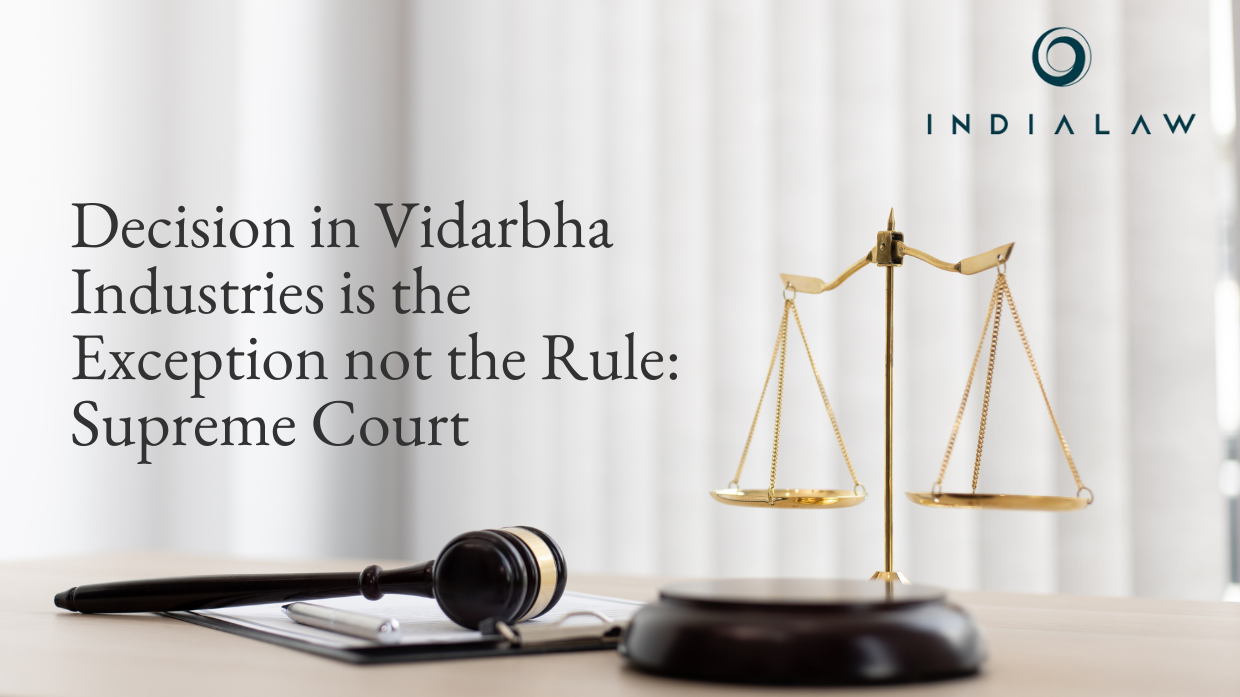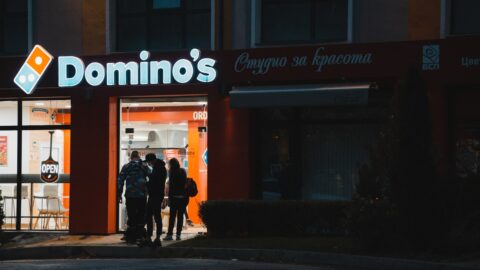Decision in Vidarbha Industries is the Exception not the Rule: Supreme Court

A Division Bench of the Supreme Court, comprising of Justice Abhay S. Oka and Justice Rajesh Bindal in M. Suresh Kumar Reddy v. Canara Bank & Ors.[1] vide Judgement dated 11.05.2023, has held that once the NCLT is satisfied that the default as occurred, there is hardly any discretion left with the NCLT to refuse admission of the application under Section 7 of the Insolvency and Bankruptcy Code, 2016 (“IBC”).
Facts:
In the year 2017, Syndicate Bank (now merged into Canara Bank) had sanctioned a secured overdraft facility and several bank guarantees to M/s. Kranthi Edifice Pvt. Ltd. (“Corporate Debtor”). Some of those bank guarantees were in favour of the State of Telangana. In the year 2020, the State of Telangana had issued a letter to Syndicate Bank to extend the bank guarantees. Shortly thereafter, the Corporate Debtor also wrote a letter to Syndicate Bank seeking extension of the bank guarantees since the Corporate Debtor apprehended that the State of Telangana was likely to encash the bank guarantees since the contracts entered into with the Corporate Debtor were under active consideration for pre-closure.
Syndicate Bank responded by stating that proposal for extension of bank guarantees and the secured overdraft facility is rejected and called upon the Corporate Debtor to forthwith repay the entire outstanding amount. On 24.04.2020 the Telangana High Court passed an interim order restraining Syndicate Bank from taking coercive steps pursuant to letters of invocation of bank guarantees.
However, Syndicate Bank had filed a Section 7 petition on 24.12.2019 against the Corporate Debtor which was admitted on 27.06.2022 by the NCLT, Hyderabad Bench. A suspended director of the Corporate Debtor, aggrieved by the admission order, preferred an appeal before the NCLAT which was dismissed vide judgment dated 05.09.2022 (“Impugned Judgement”).
The present appeal is filed before the Supreme Court challenging the Impugned Judgment. While issuing court notice, the appellant submitted before the Supreme Court that a One-Time Settlement proposal was submitted to Canara Bank (erstwhile Syndicate Bank),which was later rejected.
Contention of Parties:
The Appellant relied on the Supreme Court’s Vidarbha Industries Power Limited v. Axis Bank Limited[2] wherein it was held that the NCLT has the discretion to reject or keep in abeyance a Section 7 petition if there are good reason to do so, by stating that despite the request of State of Telangana, Syndicate Bank did not extend the bank guarantees, which forced the Corporate Debtor to commit default. The Appellant also argued that pursuing the Section 7 petition would amount to a coercive step by Canara Bank which was prohibited by the interim order of the Telangana High Court.
Canara Bank argued that the judgement in Vidarbha (supra) was rendered under a very specific set of facts that were not present in the case at hand. Canara Bank also relied on the Supreme Court’s judgment in E.S Krishnamurthy and others v. Bharath Hi Tech Builders Private Limited[3], to argue that if the NCLT is satisfied there is a debt and default, it is bound to admit a petition under Section 7 of the IBC.
Findings of the Supreme Court:
The Supreme Court referred to their decision in Innoventive Industries Limited v. ICICI Bank and Another[4]wherein the entire scope of Section 7 was explained and it was held that if NCLT is satisfied there is a debt and default, it is bound to admit a petition under Section 7 of the IBC, which was reiterated in E.S Krishnamurthy (supra), while holding that the NCLT cannot direct parties to enter into settlement terms.
The Supreme Court observed as follows,
“10. Thus, once NCLT is satisfied that the default has occurred, there is hardly a discretion left with NCLT to refuse admission of the application under Section 7.
… Thus, even the non-payment of a part of debt when it becomes due and payable will amount to default on the part of a Corporate Debtor. In such a case, an order of admission under Section 7 of the IB Code must follow. If the NCLT finds that there is a debt, but it has not become due and payable, the application under Section 7 can be rejected. Otherwise, there is no ground available to reject the application.”
The Supreme Court went on to observe that it was clarified in the Review Petition[5]of Vidarbha (supra), that the decision in Vidarbha (supra) was given under a very specific set of facts. Therefore, the Supreme Court held that the decision in Vidarbha (supra) cannot be read and understood as taking a view that is contrary to the view taken in Innoventive Industries (supra)and E.S Krishnamurthy (supra).
The Supreme Court observed that in the present case, the amount payable also included the amounts under the fund-based overdraft facilities, and that the Order of the Telangana High Court did not relate to all the bank guarantees given by Canara Bank nor was there any finding in the said Order that the Corporate Debtor is not liable to pay the dues.
The Supreme Court concluded that in the facts of the present case, there were no good reasons for the NCLT to exercise its discretion and reject the Section 7 petition and accordingly dismissed the appeal and upheld the judgments of the NCLAT and the NCLT.
The present judgment of the Supreme Court is instrumental in clarifying that the discretion granted to the NCLT while dealing with Section 7 petitions must be used sparingly and only with good reasons. The Supreme Court has iterated that the ruling in Vidharbha (supra)is only an exception to the rule laid down in Innoventive Industries (supra) and E.S Krishnamurthy (supra).
[1]Civil Appeal No. 7121 of 2022
[2] 2022 (8) SCC 352
[3] (2022) 3 SCC 161
[4] (2018) 1 SCC 407
[5]Axis Bank Limited v. Vidarbha Industries Power Limited, Review Petition (C) No.1043 of 2022.
By entering the email address you agree to our Privacy Policy.



